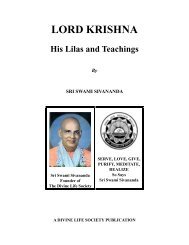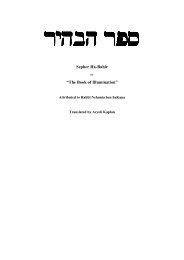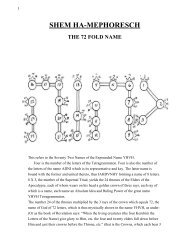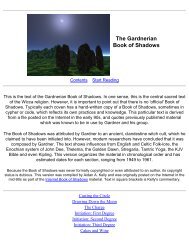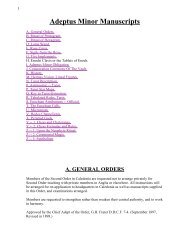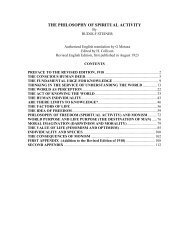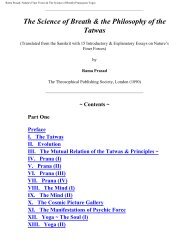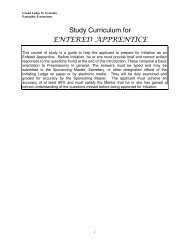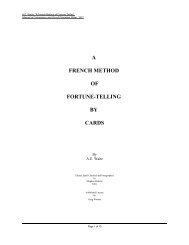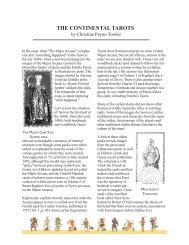Band 2 Anthropogenesis - H.P. Blavatsky
Band 2 Anthropogenesis - H.P. Blavatsky
Band 2 Anthropogenesis - H.P. Blavatsky
Create successful ePaper yourself
Turn your PDF publications into a flip-book with our unique Google optimized e-Paper software.
"island" or continent was submerged, there hardly seems any reconciliation possible between the figures. But there is, in<br />
truth. Plato, being an Initiate, had to use the veiled language of the Sanctuary, and so had the Magi of Chaldea and<br />
Persia, through whose exoteric revelations the Persian legends were preserved and passed to posterity. Thus, one finds<br />
the Hebrews calling a week "seven days," and "a week of years" when each of its days represents 360 solar years, and<br />
the whole "week" is 2,520 years, in fact. They had a Sabbatical week, a Sabbatical year, etc., etc., and their Sabbath<br />
lasted indifferently 24 hours or 24,000 years -- in their secret calculations of the Sods. We of the present times call an age<br />
a century. They of Plato's day, the initiated writers, at any rate, meant by a millenium, not a thousand but 100,000 years;<br />
Hindus, more independent than any, never concealed their chronology. Thus, when saying 9,000 years, the Initiates will<br />
read 900,000 years, during which space of time -- i.e, from the first appearance of the Aryan race, when the Pliocene<br />
portions of the once great Atlantis began gradually sinking* and other continents to appear on the surface, down to the<br />
final disappearance of Plato's small island of Atlantis, the Aryan races had never ceased to fight with the descendants of<br />
the first giant races. This war lasted till nearly the close of the age which preceded the Kali Yug, and was the<br />
Mahabharatean war so famous in Indian History. Such blending of the events and epochs, and the bringing down of<br />
hundreds of thousands into thousands of years, does not interfere with the numbers of years that had elapsed, according<br />
to the statement made by the Egyptian priests to Solon, since the destruction of the last portion of Atlantis. The 9,000<br />
years were the correct figures given. The latter event has never been kept a secret, and had only faded out of the<br />
memory of the Greeks. The Egyptians had their records complete, because isolated; for, being surrounded by sea and<br />
desert, they had been left untrammelled by other nations, till about a few millenniums before our era.<br />
History, for the first time, catches a glimpse of Egypt and its great mysteries through Herodotus, if we do not take into<br />
account the Bible, and its queer chronology.** And how little Herodotus could tell is<br />
[[Footnote(s)]] -------------------------------------------------<br />
* The main continent perished in the Miocene times, as already stated.<br />
** From Bede downwards all the chronologists of the Church have differed among themselves, and contradicted each<br />
other. "The chronology of the Hebrew text has been grossly altered, especially in the interval next after the Deluge":--<br />
says Whiston (Old Test., p. 20).<br />
------------------------------------------------------------------------<br />
[[Vol. 2, Page]] 396 THE SECRET DOCTRINE.<br />
confessed by himself when speaking of a mysterious tomb of an Initiate at Sais, in the sacred precinct of Minerva. There,<br />
he says "behind the chapel . . . is the tomb of One, whose name I consider it impious to divulge . . . In the enclosure stand<br />
large obelisks and there is a lake near, surrounded with a stone wall formed in a circle. In this lake they perform by night,<br />
that person's adventures, which they call Mysteries: on these matters, however, though I am accurately acquainted with<br />
the particulars of them, I must observe a discreet silence" (ii. 170).<br />
On the other hand, it is well to know that no secret was so well preserved and so sacred with the ancients, as that of their<br />
cycles and computations. From the Egyptians down to the Jews it was held as the highest sin to divulge anything<br />
pertaining to the correct measure of time. It was for divulging the secrets of the Gods, that Tantalus was plunged into the<br />
infernal regions; the keepers of the sacred Sibylline Books were threatened with the death penalty for revealing a word<br />
from them. Sigalions (images of Harpocrates) were in every temple -- especially in those of Isis and Serapis -- each<br />
pressing a finger to the lips; while the Hebrews taught that to divulge, after initiation into the Rabbinical mysteries, the<br />
secrets of Kabala, was like eating of the fruit of the Tree of Knowledge: it was punishable by death.<br />
And yet, we Europeans accepted the exoteric chronology of the Jews! What wonder that it has influenced and coloured<br />
ever since all our conceptions of science and the duration of things!<br />
The Persian traditions, then, are full of two nations or races, now entirely extinct, as some think; whereas, they are only<br />
transformed. They are ever speaking of, and describing the mountains of Kaf (Kafaristan?), which contain a gallery built<br />
by the giant Argeak, wherein the statues of the ancient men under all their forms are preserved. They call them Sulimans<br />
(Solomons), or the wise kings of the East, and count seventy-two kings of that name.* Three among them reigned for<br />
1,000 years each. (Herbelot, p. 829.)<br />
Siamek, the beloved son of Kaimurath (Adam), their first king, died murdered by his giant brother. The father had a<br />
perpetual fire preserved on the tomb which contained his cremated ashes; hence -- the origin of fire-worship, as some<br />
Orientalists think.<br />
Then came Huschenk, the prudent and the wise. It was his dynasty which re-discovered metals and precious stones,<br />
which had been concealed by the Devs or Giants in the bowels of the earth; how to make brass-work, to cut canals, and<br />
improve agriculture. As usual, it is Huschenk, again, who is credited with having written the work called<br />
[[Footnote(s)]] -------------------------------------------------<br />
* Thence King Solomon, whose traces are nowhere to be found outside of the Bible, and the description of whose<br />
magnificent palace and city dovetail with those of the Persian tales; though they were unknown to all pagan travellers,<br />
even to Herodotus.<br />
------------------------------------------------------------------------<br />
[[Vol. 2, Page]] 397 THE PERSIAN PHOENIX.<br />
"Eternal Wisdom," and even with having built the cities of Luz, Babylon and Ispahan, though they were built ages later.<br />
But as modern Delhi is built on six other older cities, so these just-named cities may be built on emplacements of other<br />
cities of an immense antiquity. As to his date, it can only be inferred from another legend.



